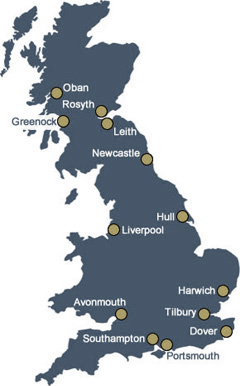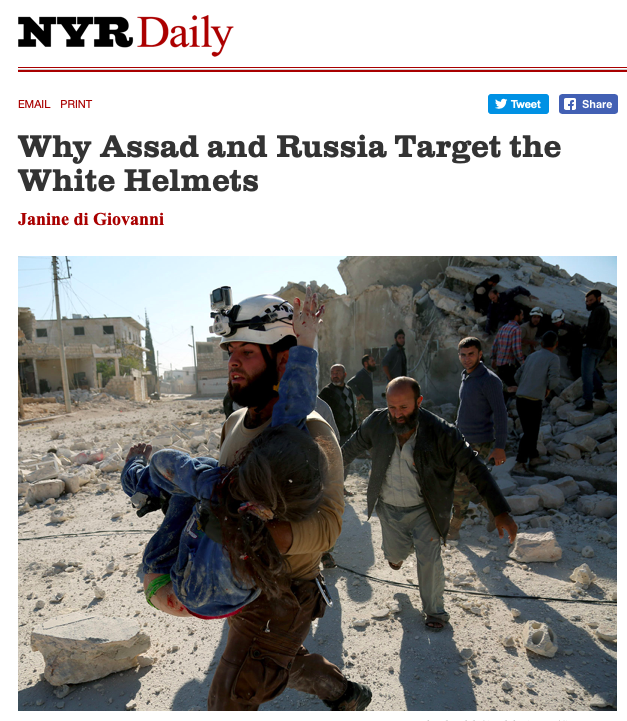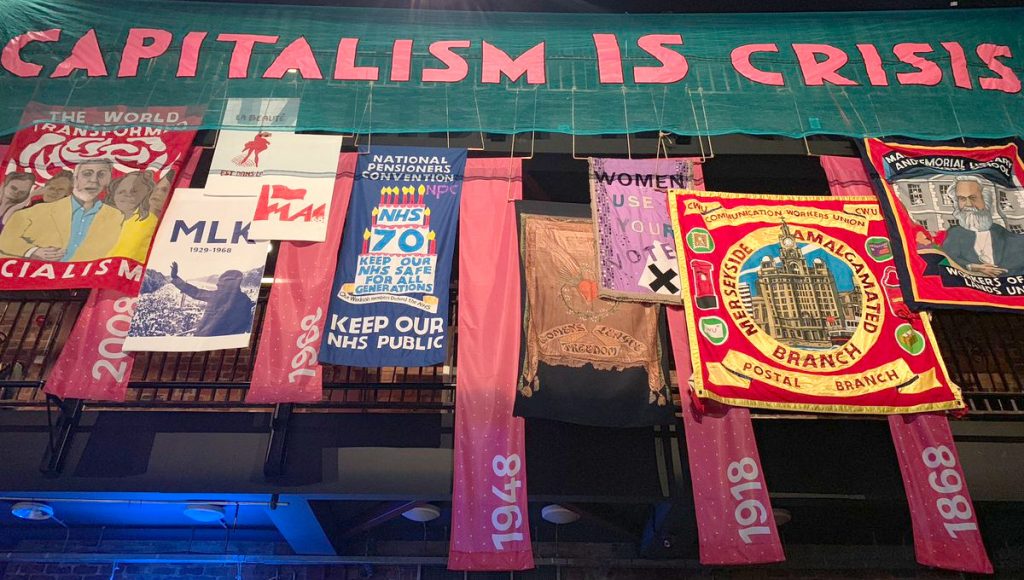It is the time of monsters. The organic crisis of the old neoliberal project has also brought forth the rise of a new radical right. Yet these monsters are quite different from one another: we have strong men like Trump, Kurz and Macron – political entrepreneurs shaping a new authoritarianism from positions of governance. Theresa May and Boris Johnson act quite similar, with less success, but unlike the others they are established representatives of authoritarian elite right-wing conservatism. They all share an anti-establishment discourse, although they have strong capital factions backing them.
The authoritarian-nationalistic regimes in Poland and Hungary (or Turkey) are distinct, and are in turn different from the radical right like the Front National, Geert Wilders’s PVV or the Alternative für Deutschland (AfD), the Austrian FPÖ and Italy’s Lega – both operating from a position of government. Very different from them, in turn, is the Five Star Movement. How can we understand these formations’ differences and commonalities? This question must be addressed to identify specific tactics and counter-strategies in the concrete countries (see Wiegel 2018).
Here, I will try to tease out a more fundamental question: how can we understand the reasons behind the rise of the radical right? Many different explanations exist, most of which are valuable in explaining certain aspects. But they exist in parallel at best, sometimes even in conflict with one another. So is there a specific relation that we could flesh out theoretically?
Beyond empirical detail, only a few attempts at systematic and subject-orientated research have been undertaken. Rarely are these conducted with recourse to or for the further refinement of critical theory. Of course, the phenomenon is extremely heterogeneous and highly dynamic and thus eludes simple explanation. It must be seen in the framework of a crisis and concrete transformation of the mode of production and living. Why has this phenomenon gained so much importance now, and not ten years ago? In fact, it was already there. I will thus seek to elaborate the concept of a generalized culture of insecurity, including highly distinct but intertwined dimensions in the context of an organic crisis of the old neoliberal project – insecurity in the field of work, family, territory and homeland, one’s own perspectives and history, gender identity or mode of living.
The following will draw on a research project conducted with the University of Stendal, a small town in eastern Germany and former stronghold of Die Linke that has now become a bastion of the AfD. We also draw on our experience from the hundreds of door-to-door conversations and our pilot project in disadvantaged neighbourhoods.
Although the Alternative für Deutschland is certainly not a workers’ party, when we look at its constituency and electorate it appears they receive a significant degree of support from workers and poor people. The French sociologist Didier Eribon calls this electoral decision an “act of self-defence” – to have a voice, to be heard in political discourse even when it is only a “negative self-affirmation.” This is true of our experience, as well. Betrayed by Social Democracy and disappointed by the powerlessness of the left, they turn to a new powerful narrative: the defence of hard-working men, of our nation, our culture, against the Other – Islam, refugees, globalization, gays and lesbians, the moralizing ’68 elite in government, etc.
This phenomenon is nothing new and well-documented. But why has it gained such momentum? Explanations often pose the dilemma of: is it the social question, or racism? In the words of Stuart Hall, we can say that “the problem is not if economic structures are relevant for racial divisions, but how they are connected” (Hall 1980, 92). He continues: “It is not the question if people make racist ascriptions, but what are the specific conditions under which racism become socially decisive and historically effective” (129).
A Culture of Insecurity
1989 marked an historical rupture that began with the crisis of Fordism in East and West 20 years before. This was a moment of generalized neoliberalism, with shock therapies in Eastern Europe and deindustrialization with social subsidies in eastern Germany. The east was a field of experimentation for neoliberal flexibilization and precarization, but was also the moment of phasing out the remains of West German and Western European Fordism.
The result was a widespread culture of insecurity – emblematic were the workfare programs all over Europe and the USA and the Agenda 2010 in Germany, which dismantled the old unemployment security system. The goal was to establish the largest precarious low-wage sector in Western Europe. The fear of falling was not limited to those at the bottom of the social hierarchy, but spread to the established so-called middle classes, who knew the safety net was fraying while experiencing a rapid intensification of work, flexibilization, and fluid structures of protection. The fear was used to produce “compliant workers,” as Klaus Dörre (2005) puts it.
The implicit social contract – promising recognition and social security in exchange for hard work – was unilaterally broken. While unions were unable to oppose this development, frustration and anger often was directed toward groups assumed to be under less pressure, performing less and taking money from the state – the unemployed, people receiving social assistance, refugees.
As I said, this reaction was not particularly true for the lowest class segments, but rather emanated from the middle – those who had something to lose, who see themselves as the productive core of society. Even when they were able to maintain or even improve their social position and status, this came at the price of increased workloads, unrestricted working hours, and exhaustive flexibility requirements.
Oliver Nachtwey (2016) found a brilliant metaphor for the situation: the image of a moving escalator going downward. One is not intended to stand still – one must struggle to avoid going downward, while moving upward proves even more exhausting. Only a few manage to take the escalator to the top. But the upper segments of society are closed off; the rich live in a world of their own.
Beyond the dramatic increase in inequality, hard divisions of respectability (not only small distinctions) were drawn: the bourgeois class produced popular images legitimizing the authoritarian education of the unemployed, migrants and other subaltern groups, pushing for a conscious class distinction from the under-performers. The parts of the working class which have something to lose draw a line against those further below, denying them respectability as well. The fear of not being respectable – the fear of falling and failing – produced a feeling of guilt leading to self-loathing directed against weaker groups and individuals: a revaluation of the self through the devaluation of others. The most effective forms of this are classism, racism, and sexism.
Beyond precarization, however, more dimensions are at the root of a culture of insecurity, and all are interconnected. A brief overview:
a) The Crisis of Male Subjectivity:
New forms of male individuality could not be generalized in neoliberalism – “emotional intelligence,” self-reflexivity, cooperative and communicative capabilities, gender equality, anti-sexist discourse and so on. In contrast, many feel a kind of feminization of work requirements as well as in family relations and child care, up to feeling forced to eat less meat. On the labour market, they experience women as fierce competition, while losing their role as family breadwinners and feeling the gender hierarchy at home has been turned upside down. Entire male-dominated sectors of the economy, often bound to a certain exploitation of nature, are threatened – from mining to automobile manufacturing. This challenges certain habits of skilled male labour, already under pressure from permanent technological requirements of re-qualification and further education. This leads to experiences of being incapable of meeting requirements – incurring a certain nostalgia for the good old notions of family, clear gender roles and male work habits. This might be a reason why men of a certain age are particularly likely to vote for the radical right and why anti-genderism is so central for them.
b) The Crisis of Female Subjectivity:
Promises of emancipation through integration into the labour market encountered several “glass ceilings”: the pay gap, omnipresent requirements of being flexible incompatible with family life – even with a more or less equal distribution of care work or delegation to others, often illegalized migrants – the new family models (Gabriele Winker) are not working, not only because of increased requirements on the job, but also because of new aspirations concerning (quality) time with children and life partners (but also to meet the competitive pressures on children within educational institutions, concerning one’s own fitness, etc.). Out of this stress between increased requirements and own aspirations, some develop a nostalgia for old family models – exaggerating the value of motherhood, especially where these new experiences meet with conservative values. This may be a reason why women vote for a radical right which is so anti-feminist – after all, liberal feminism rarely addresses these needs and problems, particularly for woman of the popular classes.
There are other dimensions as well, but we lack the space to delve into them. I will simply name them:
c) Insecurity due to certain kinds of lifestyles growing outdated, losing their claim to what is culturally “normal.” Old milieus dissolve and new modern, diverse, cosmopolitan, multi-cultural and multi-lingual lifestyles seem to dominate media and advertising. The world and experience of skilled workers is no longer the standard – it becomes unsettled, proletarianized. Being sensitive to gender, ecologically responsible, accepting of gay and queer people, using a non-discriminatory language etc. – all of these are perceived as “political correctness” directed against persistent but outdated habits. This often meets with pre-existing prejudice and may revert into aggressive denial and intolerance.
d) Insecurity due to “external threats”: experiencing the demise of social infrastructures (especially schools, public transport, public administration and police, public security in general), particularly in certain regions, causes real social problems but is not traced back to the roots of neoliberal reform, instead falsely associated with assumed external causes like “migration into our social systems,” ”’kanakization’ of our schools,” “parallel societies,” migrant delinquency or Islamism, even terrorism, but also job insecurity because of multinational corporations, European reforms, or competition through labour migration. This often links up with pre-existing racial prejudice, which becomes increasingly important for individuals against this backdrop.
e) Insecurity through discharged democratic institutions and organized irresponsibility: who decides on new requirements, what kinds of life experiences and identities are still represented, where do I have a voice in family decisions, in living my own identity, in transnational production chains or in despotic low-wage relations? Economic imperialism is eating away at individual responsibility. One cannot direct demands toward a super-powerful globalized market. Politics seems to have deprived itself of power vis-à-vis the market and detached itself from the people, even become corrupt. Democracy is becoming a play without any real actors. This may often be articulated mistakenly, but the experience is real: feeling helpless and powerless, without control of one’s conditions of life. This reverts into “anger without a target” (Detje et al. 2013), and to an “extreme fatalism” (Haug 1993, 229): “You can do nothing about it.”
The point is: when the various dimensions come together, this can condense into a state of panic (Balibar/Wallerstein 1990, 271). The radical right is mobilizing and fuelling a “moral panic” (Demirović 2018, 29). This way, they encourage the subaltern to disconnect their feelings from efforts to understand the reasons behind their predicament and translate them directly into resentment, racism, coldness, and denial of solidarity instead. The reward is attention and false grief from above: “We have understood, and we take your worries and concerns seriously,” etc. (32).
Bizarre Everyday Consciousness and Right-Wing Populism
Most of the time, however, we encounter a bizarre form of everyday consciousness (Gramsci), not a coherent and closed view of the world, but what W.F.Haug calls “proto-ideological material” (Haug 1993, 52), meaning impulses and elements of feeling and thinking which are not yet ideologically determined. The impulse of discontent and anger is not in itself ideological. This depends on how it articulates itself or is articulated along with other elements. Thus, discontent can be translated into solidarity and horizontal practices of association from below, or revert into hierarchical forms, depreciating and excluding the Other.
If we seek to understand the rise of the radical right, it is less about right-wing attitudes in the population (as can be found in polls for the last 20 years or so) than it is about how these loose, proto-ideological impulses, feelings, forms of thinking, desires and aspirations – often in contradiction to one another – are integrated into a political project, giving them a coherent articulation. This explains why right-wing attitudes may decline in the polls, while the right-wing agenda continues to rise in the public eye.
This is not a mono-causal process: proto-ideological material is formed and processed in constant discourses in various ideological apparatuses such as the media and political parties, but also in schools, on the shop floor, in associations or in the family. At the same time, social individuals appropriate political discourses in the sense of active subjectivation, adapting them to their respective conditions in order to gain at least a “restrictive capacity to act” (Holzkamp 1987). The question is “how the social individuals integrate themselves in to the existing structures (and discourses), thereby shaping their own subjectivity” (F.Haug 1983, 16). But we also have to ask why leftist or solidary discourses are less effective than elsewhere, for instance in Spain or Greece (see Candeias and Völpel 2013).
Especially when the experience of solidarity is lacking or disappointed, this opens a window of opportunity for the radical right. When the experience of solidary practice or the prospect for their possible success is absent, this may lead to stubborn dissidence, as represented also by the radical right: their dissidence at the same time defends the status quo of existing social relations, the “good old past,” while questioning them partially. There is a dominant feeling of “extreme fatalism,” very aware of its powerlessness against “those at the top,” re-enacting a rebellious gesture, combined with an “extreme voluntarism” (Haug 1993, 229) against the weaker social groups at “the bottom and outside,” very aware that they face little danger of being sanctioned for that. This attitude is in “opposition to the ruling bloc in power,” but is “dangerous” only where the foundation of capitalist rule is not concerned (222). The radical right enables social individuals a “nonconformist conformism” (Thomas Barfuss): an attitude of resistance toward the ruling power bloc, at the same time requesting (in a form of interpellation) for their action to depreciate and actively exclude “the Other” – migrants, those “unwilling to work,” the “toxic ‘68er,s” feminists, etc. This can be experienced as stabilizing a restrictive capacity to act under heightened conditions of insecurity.
The new authoritarianism could be read as an “attempt to build a coalition with parts of the petit bourgeoisie and the working class from the side of the bourgeois class, without the need to make concessions. It works like a short circuit between the forces of the bourgeoisie and the subaltern” (Demirović 2018, 34). In doing so, this does not lead to a simple rejection of democracy, but to its reactionary re-making – an illiberal democracy – a plebiscitary strategy, dividing and mobilizing along the lines of racism, nationalism, religion, sex and gender, or form of exploitation of nature, “reproducing and disarranging the bizarre everyday consciousness, converting into neurotic subjectivities” (ibid).
Their form of mobilizing is connected to an imagined self-empowerment of the subaltern, based on the promise of taking back control. Once the different proto-ideological elements are articulated in a coherent way, it is much more difficult to re-articulate them in a different manner.
New Relations of Representation
Against the backdrop of this culture of insecurity, modernized radical right parties – the ugly siblings of neoliberalism – could be established in many European countries over the last 20 years. In Germany, they vanished time and again, but authoritarian or racist attitudes spread nevertheless. With the rise of the Alternative für Deutschland, one could say the country reverted to the European norm (Opratko 2016). Its appearance led to a complete shift of the whole political and ideological spectrum toward the right, creating a new relation of representation (Demirović 2018, 28). The previous “anger without a target” found a representative to articulate this anger – not in the sense of simple expression of that anger, but in a specific coherent and increasingly radical way.
The AfD began with the dream of a return to the Deutschmark and a strong national, one could almost say “imagined economy.” The rise could not have been consolidated with the critique of the Euro alone, however. The clear class character of the project, created by angry neoliberal professors looking with arrogance and disdain at the subaltern, would have been too obvious.
Only taking up and intensifying the anti-migration, anti-Muslim, anti-feminist, homophobic and anti-liberal discourse strategically directed against all minorities enabled the party to invert popular discord into popular compliance – against its own class composition concerning its constituency and leadership (cf. Hall 1982, 114). Polemics against “migration into our social security systems” and turning the social question into an ethnic question proved particularly effective (Wiegel 2014, 83).
Insofar as the ethno-nationalist and social wings of the party are becoming more influential (in the workplace as well), their notion of “exclusive solidarity” (Dörre 2005) could broaden their appeal in sections of the working class. It does not seem to matter that the party advocates for the most radical neoliberal reforms at the same time. In fact, they play with ambiguity, relativizing truth. This is one of their most effective strategies. They have succeeded in re-articulating the populist agenda and asserting right-wing hegemony in public discourse.
Most of the other parties are taking up this agenda, always with a shift to the right – even the media, and talk shows in particular. Now, it would seem, people can say whatever they want in public. An astonishing symbol was the last German government crisis between Horst Seehofer, Minister of the Interior and head of the right-wing Bavarian CSU (the sister party of the ruling CDU), and Chancellor Angela Merkel. It revolved around closed detention centres and how to send back refugees, completely ignoring the mass carnage in the Mediterranean. The radical right has set the agenda and are “on the hunt,” as Alexander Gauland, head of the AfD, said. Only a few weeks later, we watched huge crowds of Neo-Nazis parade through the small city of Chemnitz (formerly Karl-Marx-Stadt), giving open Hitler salutes and chasing people of colour through the streets, with a small number of police units unable and unwilling to stop the mob (while any leftist or anti-fascist activity is confronted with huge numbers of militarized anti-terror units). The head of the secret service (the so-called “Federal Office for the Protection of the Constitution”), Hans-Georg Maaßen, denied the incidents and implied that media coverage and film footage had been “fake news.” Following extensive public outcry, this prompted another government crisis with Seehofer backing Maaßen, while Merkel and her coalition partner SPD demanded his demotion. In the end, Maaßen was removed from his position but only to become state secretary for internal security and cyber security. The crisis is still smouldering and the established parties are losing popularity, pushing more people toward frustration and toward the anti-elite course of the AfD.
The radical right’s strategy is combined with an open hostility toward parliamentarism and its democratic procedures, while using the parliament as a stage. Of course, post-democracy already began under neoliberalism, but now it approaches a rupture with democratic procedures – starting with Berlusconi, then Orbán, Trump, etc. The radical right, one could say, is doing the legwork for a new authoritarian project.
Attempts are ongoing to assert political control over jurisdiction (in Poland, Hungary, the USA, Turkey) and constrain freedom of the press, or at least disparage them as “lying press” while deploying fake news and “alternative facts,” often combined with a vulgar historical revisionism. The rights of minorities, women, unions, and science are at least questioned. A violent language becomes normal, affirming and relativizing physical violence, enforcing security discourses and repressive apparatuses. Expanding the range of acceptable language is expanding the space for maliciousness from open hatred to real individual violence. I think these are clear tendencies of what in German is called Faschisierung: not fascist regimes, but clear tendencies against a democratic and solidary mode of living.
Racism from Below as Reactionary Self-Empowerment and Expansion of One’s Capacity to Act
The production and combating of “the Other” plays a central role here.
The tremendous heterogeneity of the subaltern classes could serve as a fruitful foundation for solidarity in plurality, but of course could also be the foundation for strategically dividing the class. This is especially done by integrating factions of the class into a hegemonic project. Forms of chauvinism, racism, sexism, and classism in the everyday consciousness – as well as the distinction of certain professions from others, different modes of consumption and lifestyle – are useful elements to expand minor differences into real divisions.
A common pattern is to compensate one’s own (real or feared) social decline by depreciating others, because the feeling of dignity and individual social position is a relative one always in comparison to others. To allocate someone else a lower position makes one feel that they not at the bottom of the social hierarchy, maybe they still part of the middle class, part of a nation – in the German case, a successful export leader and football world champion (the latter may be weakened after the last World Cup, where Germany was knocked out in the first round).
Racism and nationalism were always present, but remained in a subaltern position in most people’s minds, emerging to the fore from time to time but not systematically. That they gained so much importance is also a symptom of the lack of effective class struggle (Balibar/Wallerstein 1990, 259). In the moment of this generalization of a culture of insecurity and crisis of the old neoliberal project, the articulation of the proto-ideological elements changes: what was marginal or less important takes on a central position in the ideological structure, becomes a point of condensation.
The ruling class seeks to divide the subaltern classes via integration into a hegemonic project. This is not a mere ideological phenomenon, but includes the realization of material interests: because of power relations and a strong workers’ movement, class compromise in Fordism was broadly inclusive, although it also produced an exterior and exhibited a patriarchal and paternalistic structure. In neoliberalism, the basis of class compromise was much smaller, more and more reduced to high-tech specialists and the core workforce in production. Export-nationalism, purchased at the dear price of austerity and wage restraint, still guarantees a highly contested degree of participation for a certain part of the working class. This kind of class compromise has high costs entailing subordination, increased flexibilization, tightened performance requirements, etc. This kind of class compromise with less and less concessions mobilizes tremendous fears of tailing to keep up in this universal “war of every one against everyone” (Hobbes, as cited by Haug 1993, 228).
This becomes evident with the constant burden of increasing contributions to social insurance and higher taxes, combined with declining benefits and crumbling social infrastructure – first due to German reunification, rising unemployment, the costs of the EU, and then the arrival of hundreds of thousands of refugees. The so-called middle classes and high performers are burdened more and more (so the story goes), while the real reasons – the dramatic re-distribution of wealth in favour of capital and the rich – are not discussed. One cannot do anything about it – otherwise they would have turned their anger against the ruling power bloc to offer at least a small portion of the economic success as part of the class compromise, albeit in a very subaltern position.
The feeling of bearing the burden grows even more when faced with heightened competition on the labour market, in housing, for access to high-quality social services, especially child care and schools, and for public space. Although the actual cause might be permanent neoliberal restructuring, some fear that with the arrival of so many refugees there will be even less left for them.
These unreasonable demands should also apply to the Other even more so, up to denying them individual and social rights. The higher the perceived pressure is, the harsher the break with solidarity vis-à-vis social groups outside the class compromise. Even a portion of those excluded, the poor, desperately want to be part of that compromise, struggling for recognition, adopting the images and forms of social exclusion against their own group to mark a distinction from them.
If it is true that racist ideology is primarily an ideology of those segments of those in-between classes – not only in the sense of ascending or descending class segments, but concerning “active negation of class solidarity,” as Balibar/Wallerstein put it (1990, 263) – then we could understand the radical right as a class alliance between descending segments of skilled labour, endangered segments of the working class that developed into a petit bourgeoisie defending their small residential property and consumptive status, between ascending individualistic high performers, family businesses under pressure from globalization, bourgeois intellectuals lacking recognition or experiencing marginalization in institutions. Concerning the descending class factions, one can speak of manifest or threatened social declassification (see Kahrs 2018), while the ascending segments and class factions are engaged in the struggle over the recomposition of the power bloc.
The mix of heightened requirements and unreasonable demands, experiences of declassification, insecurity, attempts to stabilize the self via imaginary communities (Benedict Anderson), racism and other forms of depreciating Others add up to a radical right articulation of initially independent phenomena. “The racial stigma and class hatred” against those below in the social hierarchy coincide with the category of migration (Balibar/Wallerstein 1990, 249). “Insofar as they project their fears and resentments, their desperation and defiance onto the strangers, they not only fight competition, as it is said, but they try to distance themselves from their own exploitation. They hate themselves as proletarians or as humans, in danger of falling into the mill of proletarianization.” (258) A constant interplay and entanglement of “class-racism” and “ethnic racism” (ibid) against the ones below and outside. The interpellation of racism (or anti-Semitism) “instantly operates like directing a magnet onto loose iron filings,” rearranging the whole political field – after which it becomes possible to “organize a populism from the right, that is to say an authoritarian constitution of Volk” (an ethnic unity of the people) (Haug 1993, 222).
Against this backdrop we can understand the growing significance of racism, chauvinism, nationalism, etc. as creating a more coherent everyday consciousness as active inscription of individuals into an ideological project from the right. This is connected with a transition from a latent to openly racist mode of living.
This is not a seduction by pied pipers of the far right, but an active subjectivation enabling a reactionary self-empowerment and expansion of one’s capacity to act. This may help to understand why the question of migration advanced as a central social line of conflict, inverting the hierarchical conflict between capital and class into a horizontal conflict between class factions in and outside of the class compromise.
The problem? The left cannot win on this terrain. We need to shift it.
Connective Class Politics from Door to Door
Thus, back to the manifold dimensions of a generalized culture of insecurity in times of an organic crisis of the neoliberal project, with uncertainty at work, in family relations, neighbourhoods and whole regions, future prospects, one’s own history, identity, gender or mode of living. This pervasive insecurity is the basis for subjective strategies to confront the situation, which in absence of experiences with solidarity receive an ideological supply from the right to win back control.
But one can link up from the left on the same basis. Most people do not have a closed view of the world, but a bizarre everyday consciousness in which conflicting impulses coexist. We have to be aware that it is much more difficult to win people back once they become part of a radical right project, seeking to lend coherence to their everyday consciousness with a radical right view of the world and a racist mode of living. But many are aware that the radical right will not solve their everyday problems of manifold insecurity, and feel discomfort and a guilty consciousness with the right. Die Linke lost 400,000 voters to the AfD in the last elections. We want them back. So, how to connect with them from the left?
This has been a focus of the debate around new connective class politics (cf. Luxemburg Special Issue, 2017) in recent years, i.e. a class politics reaching beyond the usual suspects (Candeias 2017), developing and experimenting with new concrete projects. This sometimes means simple things that seem so difficult: knocking on doors in disadvantaged neighbourhoods all over Germany (and especially in the left’s former strongholds), taking lessons from Greece and Spain, the Netherlands, Austria, Great Britain and the USA (cf. Steckner 2017a, Pieschke 2016). We need patience and endurance to build active relations. We have to listen, debate, organize local meetings centred around everyday problems such as neighbourhood rent policies or struggles in and for health and child care services. We have to come back and try again. It was often a surprising experience for both sides: first to be approached at all, and then to have a political conversation focused on everyday problems.
We sent hundreds of militants to knock on doors all over Germany. Our activists of course encountered resentment and racism, even among people leaning to the left. Nevertheless: most of the time, a conversation was possible. Frequently, people responded the question of what has to happen for their situation to progress with “Asylanten” – a derogatory term for asylum seekers – “must go!”
“Okay, but was your situation better before the refugees came – or do you expect it will be better when they are gone?”
“No! I know that this will not change, even with the AfD…”
People then started to talk about their own problems: that they have three kids, receive social assistance but are not able to pay the rent or buy enough food or a birthday present for their kids, and so on. Less political correctness and more listening and taking experiences seriously – without denying one’s political point of view.
Other studies confirm our findings: according to a recent study documenting a door-knocking project across more than 500 doors in Germany and France (Hillje 2018), the first things people would like to change if they were in power were: “higher minimum wages, universal basic income, and more assistance to single mothers” (15f).
The same study concluded that “when people talk about politics in their own words, fear of Islam, Euroscepticism, the ‘lying media’ or an emphasis on national identity doesn’t play a major role.” They do not even have anything against migrants, at least it is not a major point, but the feeling that politics follows the wrong priorities, is not serving their needs, especially in disadvantaged regions or neighbourhoods.
As discussed above, they do not necessarily believe that the AfD or Front National could really solve their problems (Hillje 2018, 10). This was also true for our conversations: voting for the radical right is more an expression of the desperate wish to be heard and have politics focused on everyday needs. We interviewed a middle-aged man who always voted for the left. After years of disappointment, he voted for the AfD. When we talked he was already sceptical that this would change anything for the better. We invited him to a longer interview. After a while we called again, he joined the local organizing initiative and will vote for the left again. This is not an isolated case. This is an opportunity for the left: to proceed from solidary forms of working together on social problems in the neighbourhood, building structures of mutual solidarity (see Candeias and Völpel 2013). This is what we are trying to develop and spread across the party, and to support movements doing similar things.
From this common ground on social issues, we can work on questions like racism and sexism as they are modified and reduced in significance to an initially reactionary capacity to act. However, we cannot stop there, as this leads to a silent toleration of these ideologies. Rather we have to work on this, with continuous training and political education, but moreover by organizing space for experiences of solidarity irrespective of one’s migrant background. Experience with refugees as part of organizing projects in the neighbourhoods is crucial. Moreover, it is at least as important to support the self-organization of migrants and refugees. How to do all this can be learned, requiring systematic training so people lose the fear of approaching the Other.
At the moment, we think it is the only and most promising way to win back those segments of the popular classes we have lost over the years – not only those who voted for the AfD, but the even larger number of people who do not vote at all (cf. Candeias 2015, Schäfer et al. 2013a, 2015).
Decisive is whether everyday experience is shaped by practical solidarity or by competition and isolation. It is not impossible that a successive practice of solidarity could be more attractive than the imagined self-empowerment of the radical right, without any solution for people’s everyday problems. It is about a “generalized capacity to act” (Klaus Holzkamp) on the path toward a common and solidary disposition about our own conditions of life – “taking back control,” but “for the many, not the few.”
A “helpless antifascism” (Haug) focusing too much on the radical right and its agenda, rushing from one counter-demonstration to another, defensively concedes the chosen terrain of struggle. We have to develop our own agenda and shift the terrain with concrete organizing around everyday social problems with connective class politics, focused not only on the antagonist from above and from the radical right, but creating its own broader basis for a lived solidarity for all (cf. Candeias 2017).
*
Note to readers: please click the share buttons above. Forward this article to your email lists. Crosspost on your blog site, internet forums. etc.
Mario Candeias is the director of the Institute for Critical Social Analysis and editor of the review LuXemburg.
Sources
- AfD, 2014: Politische Leitlinien der AfD.
- Balibar, Etienne, u. Immanuel Wallerstein, 1990: Klasse, Rasse, Nation. Ambivalente Identitäten, Hamburg/Berlin.
- Candeias, Mario, 1999: 1989-1999 – Die Wende als Ausdruck neoliberaler Verallgemeinerung, in: Das Argument 232, Heft 5/1999, www.trend.infopartisan.net/trd7802/t127802.html.
- ––, 2004: Neoliberalismus. Hochtechnologie. Hegemonie. Grundrisse einer transnationalen Produktions- und Lebensweise, erw. 2. Aufl., Berlin/Hamburg 2009.
- ––, 2008: Verallgemeinerung einer Kultur der Unsicherheit. Prekarisierung, Psyche und erweiterte Handlungsfähigkeit, in: VPP Verhaltenstherapie und psychosoziale Praxis (Zeitschrift der DGVT), H. 2, 40. Jg., 249-68.
- ––, 2015: Gegenmittel gegen autoritären Neoliberalismus und Rechtspopulismus – Perspektiven einer verbindenden linken Partei, in: Rechtspopulismus in Europa, RLS Materialien 12, rosalux.de/publikation/id/8340/rechtspopulismus-in-europa.
- ––, 2017: Eine Frage der Klasse. Neue Klassenpolitik als verbindender Antagonismus, in der Broschüre „Neue Klassenpolitik“ der Zeitschrift LuXemburg, Oktober, 2-13, zeitschrift-luxemburg.de/luxemburg-spezial-zu-neuer-klassenpolitik
- Candeias, Mario, u. Eva Völpel, 2013: Plätze sichern. ReOrganisierung der Linken in der Krise, Hamburg
- Demirović, Alex, 2018: Autoritärer Populismus als neoliberale Krisenbewältigungsstrategie, in: Prokla190, 27–42
- Detje, Richard, Wolfgang Menz, Sarah Nies u. Dieter Sauer, 2011: Ohnmacht und Wut, in: LuxemburgH.2, 52-61, www.zeitschrift-luxemburg.de/ohnmacht-und-wut/
- Dörre, Klaus, 2005: Prekarität. Eine arbeitspolitische Herausforderung, in: WSI-Mitteilungen 5, 250–58
- Falkner, Thomas, u. Horst Kahrs, 2018: Deutungsmuster zum Erfolg der AfD bei der Bundestagswahl 2017 – ein Bericht zu neueren empirischen Studien, Rosa-Luxemburg-Stiftung, Berlin
- Hall, Stuart, 1982: Popular-demokratischer und autoritärer Populismus, in: Neue soziale Bewegungen und Marxismus, Argument-Sonderheft 78, Berlin
- ––, 1980: ‚Rasse‘, Artikulation und Gesellschaften mit struktureller Dominante, in: ibid., Rassismus und kulturelle Identität, Ausgew. Schriften, Bd. 2, 89-136, Hamburg 1994
- Haug, Frigga, 1983: Sexualisierung der Körper (1991), Berlin/Hamburg
- Haug, Wolfgang Fritz, 1993: Elemente einer Theorie des Ideologischen, Berlin/Hamburg
- Hillje, Johannes, 2018: Rückkehr zu den politisch Verlassenen. Studie rechtspopulistischen Hochburgen in Deutschland und Frankreich.
- Hilmer, Richard, Bettina Kohlrausch, Rita Müller-Hiller u. Jérémy Gagné, 2017: Einstellungen und soziale Lebenslage. Eine Spurensuche nach Gründen für rechtspopulistische Orientierung, auch unter Gewerkschaftsmitgliedern, Working Paper Forschungsförderung der Hans-Böckler-Stiftung Nr. 44, August
- Holzkamp, Klaus, 1987: ›Grundkonzepte der Kritischen Psychologie‹, in: AG Gewerkschaftliche Schulung und Lehrerfortbildung (Hg.), Wi(e)der die Anpassung, Soltau 1987a, 13-19; www.kritische-psychologie.de
- Kahrs, Horst, 2018: Versuche, uns und anderen die rechtspopulistische Dynamik
- in Deutschland zu erklären, in: M.Candeias (Ed.), Rechtspopulismus, radikale Rechte, Faschisierung,Berlin, 16-32
- Luxemburg Special Edition, 2017: New Class Politics, with Mario Candeias, Bernd Riexinger, Barbara Fried, Anne Steckner, Alex Demirović, Bernd Röttger a. Markus Wissen, October, zeitschrift-luxemburg.de/lux/wp-content/uploads/2017/10/LUX-Special-New-Class-Politics-E-Paper.pdf
- Nachtwey, Oliver, 2017: Die Abstiegsgesellschaft, Frankfurt/M
- Opratko, Benjamin, 2016: Mit der AfD kommt Deutschland in der Normalität an, in: Huffington Post v. 3.02.2016, huffingtonpost.de/benjamin-opratko/afd-deutschland-osterreich_b_9148352.html
- Pieschke, Miriam, 2016: Vom kurzen Flirt zur langfristigen Beziehung. Organisierung im Kiez als transformatorisches Projekt, in: Luxemburg, H.2, 108-13, zeitschrift-luxemburg.de/vom-kurzen-flirt-zur-langfristigen-beziehung
- PSUREG, Projekt Subjekt- und hegemonietheoretische Untersuchung des Rechtspopulismus & Entfaltung emanzipatorischer Gegenmacht, 2018: Reaktionär, rassistisch, rechts: Die Entwicklung der AfD in Sachsen-Anhalt und Stendal, RLS-Studie, rosalux.de/publikation/id/38891/reaktionaer-rassistisch-rechts/
- Reimer, Katrin, 2011: Kritische politische Bildung gegen Rechtsextremismus und die Bedeutung unterschiedlicher Konzepte zu Rassismus und Diversity. Ein subjektwissenschaftlicher Orientierungsversuch in Theorie- und Praxiswidersprüchen, Fachbereich Erziehungswissenschaft und Psychologie der Freien Universität Berlin, Berlin, d-nb.info/102635840X/34
- Schäfer, Armin, Robert Vehrkamp u. Jérémie Gagné, 2013: Prekäre Wahlen. Milieus und soziale Selektivität der Wahlbeteiligung bei der Bundestagswahl 2013; unter: wahlbeteiligung2013.de
- ––, u. Sigrid Roßteutscher, 2015: Räumliche Unterschiede der Wahlbeteiligung bei der Bundestagswahl 2013: Die soziale Topografie der Nichtwahl; in: K.-R.Korte (Hg.): Die Bundestagswahl 2013, Wiesbaden, 99-118
- Steckner, Anne, 2017a: „Die Asys müssen weg!“ Warum die Linke mit den Leuten reden sollte, statt über sie, in LuXemburg 1/2017, 74–81.
- ––, 2017b: Auswertung der bundesweiten Haustürbefragungen, Bereich Strategie und Grundsatzfragen, DIE LINKE, Juli
- Wiegel, Gerd, 2014: Rechts der Union. Wie die AfD den Spagat zwischen Eliteprojekt und Rechtspopulismus versucht, in: LuXemburg 1/2012, 82–87
- ––, 2018: Die modernisierte radikale Rechte in Europa. Ausprägungen und Varianten, in: M. Candeias (Ed.), Rechtspopulismus, radikale Rechte, Faschisierung, Berlin, 5-15.
Notes
Featured image is from The Bullet.








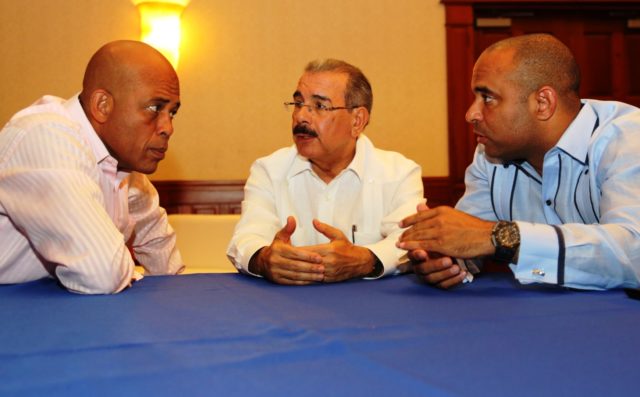
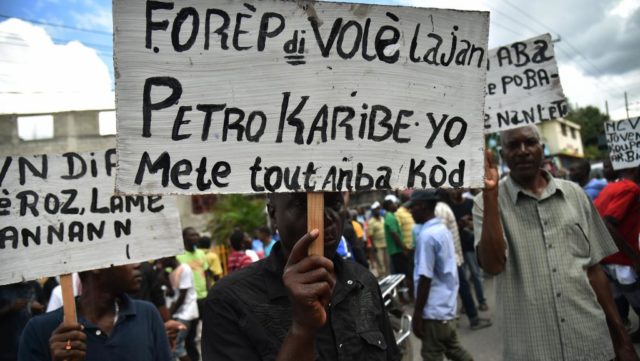
 Title:
Title: 

